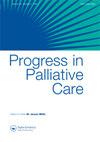在澳大利亚的专科姑息治疗服务的护士执业作用的评估
IF 0.9
Q4 PUBLIC, ENVIRONMENTAL & OCCUPATIONAL HEALTH
引用次数: 1
摘要
摘要在澳大利亚,尽管对姑息治疗的需求越来越大,但姑息治疗专业人员仍然短缺。文献表明,执业护士(NP)处于创新当前姑息医学模式的有利地位。这项前瞻性研究评估了在已建立的多学科姑息治疗服务中新的NP角色的实施情况。在这项研究中,与其他服务相比,接受NP护理的患者入住急性医院的人数更少(17.0%对27.2%),以及没有急性入院接受临终关怀,有更多的患者达到了他们的首选死亡地点(87.2%对72.2%)。对多学科团队的调查显示,大多数应答者(93.3%)认为NP的作用对患者护理有积极影响,是整体的、安全的,并满足了患者的需求。中立或消极的调查回应强调了在处方和将患者直接转诊给医学专家的能力等领域进一步教育或完善角色的必要性。总体而言,研究结果是积极的,支持将NP角色引入专业姑息治疗服务,但还需要更多的研究来评估该角色的有效性。本文章由计算机程序翻译,如有差异,请以英文原文为准。
Evaluation of a nurse practitioner role within a specialist palliative care service in Australia
Abstract In Australia, despite the growing need for palliative care, there is a shortage of palliative care professionals. The literature suggests that nurse practitioners (NPs) are well positioned to innovate the current model of palliative medicine. This prospective study evaluates the implementation of a new NP role within an established multidisciplinary palliative care service. In this study, patients under the care of the NP had fewer admissions to an acute hospital compared to the rest of the service (17.0% vs. 27.2%), as well as no acute admissions for terminal care and a greater number of patients who achieved their preferred place of death (87.2% vs. 72.2%). A survey of the multidisciplinary team revealed that the majority of responders (93.3%) felt that the NP role had a positive impact on patient care and was holistic, safe, and met patients’ needs. Neutral or negative survey responses highlighted the need for further education or refinement of the role in areas such as prescribing and ability to refer patients directly to medical specialists. Overall, study results were positive and support the introduction of the NP role into a specialist palliative care service but more research is required to assess the effectiveness of the role.
求助全文
通过发布文献求助,成功后即可免费获取论文全文。
去求助
来源期刊

PROGRESS IN PALLIATIVE CARE
PUBLIC, ENVIRONMENTAL & OCCUPATIONAL HEALTH-
CiteScore
2.60
自引率
11.80%
发文量
24
期刊介绍:
Progress in Palliative Care is a peer reviewed, multidisciplinary journal with an international perspective. It provides a central point of reference for all members of the palliative care community: medical consultants, nurses, hospital support teams, home care teams, hospice directors and administrators, pain centre staff, social workers, chaplains, counsellors, information staff, paramedical staff and self-help groups. The emphasis of the journal is on the rapid exchange of information amongst those working in palliative care. Progress in Palliative Care embraces all aspects of the management of the problems of end-stage disease.
 求助内容:
求助内容: 应助结果提醒方式:
应助结果提醒方式:


